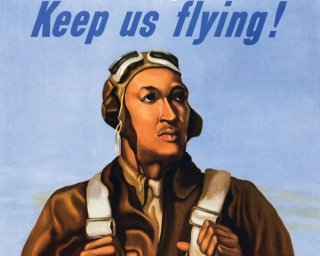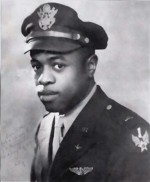Title
Subhead

Percussion alum LeRoy Battle was a Tuskegee Airman during World War II. This poster was for the Airmen.
This article is part of a special section on Juilliard and the military in World War II.
Body
Victory over fascism was hard-won—but there were still many battles to be fought so that all Americans could have equal rights at home. A couple of stories came up as we were researching this article that touched on how that struggle affected some of our alums.
Shortly before we went to press, we learned that LeRoy Battle (’46, percussion) had passed away at 93. Battle was a member of the elite Tuskegee Airmen, the first African-American military aviators in the U.S. Armed Forces, which were strictly segregated at the time. (It took a lawsuit for the Army to even set up the training course for African-American soldiers, at what was then called Tuskegee Institute in Alabama.)
Despite the fact that these elite aviators were highly decorated, they still fought prejudice at home. In 1945, Battle and more than 100 of his fellow officers tried to integrate the officers’ club at their base in Indiana. Threatened with court-martial, 20 of the airmen, including Battle, continued to press to desegregate. The case wound through official channels; one of the officers was court martialed; Battle and others were reprimanded. Eventually, their efforts paid off. President Harry Truman desegregated the armed forces in 1948, and in 2007, the airmen were given Congressional Medals of Honor. Battle wheeled himself to the podium to accept, later telling reporters, “This is a beautiful day. I am so thankful to be alive ... to see this.”
Battle had a long career in the Maryland schools, was the leader and drummer for Roy Battle’s Altones for more than 50 years, and spent 17 years in the Washington Redskins marching band. He died while wearing his Tuskegee Airmen squadron cap and listening to an Altones recording, according to his obituary in the Capital Gazette; his wife of 56 years had died a few months earlier.
Another alum who tried to fight segregation in the armed forces was Milton Fink (B.S. ’48, double bass). Though he’d studied cello in high school (including at Juilliard’s renowned summer program), Fink became a bugler in the Army and formed a band with other musicians, some of whom had been with the orchestras of Benny Goodman, Tommy Dorsey, and others. Eventually, he said, “the top brass heard about us and we were absorbed by a regular army band and transferred to Lake Placid (N.Y.).” They were stationed at the Lake Placid Club, and even though the formerly fancy club was being used as a recuperation center for wounded veterans, “it wouldn’t accept our black members—the government still refused to integrate,” he recalled. Earlier he and his fellow musicians were threatened with court martial when they’d said they didn’t want the black musicians in their ranks to have to eat and sleep in separate camps.
Fink was still at Lake Placid when President Roosevelt died, in 1945, and even though it was mid-April, it was so cold that the valves on his sousaphone froze when he tried to play at the memorial. “I just kept pounding on the valves, but it didn’t help,” he said. “They didn’t know about antifreeze at the time.”
Despite some issues, Fink said his experience in the armed forces was positive overall: “It prepared me educationally as well as professionally.” After finishing up at Juilliard (by that time he had switched to double bass), he eventually became the supervisor for high school music in New York City until his retirement in 1995. At that point, he started playing the cello again, and he’s still playing, despite health challenges, at age 92.Percussion alum LeRoy Battle was a Tuskegee Airman during World War II.
Online exclusive: For more of Milton Fink's reminiscences, click here.





